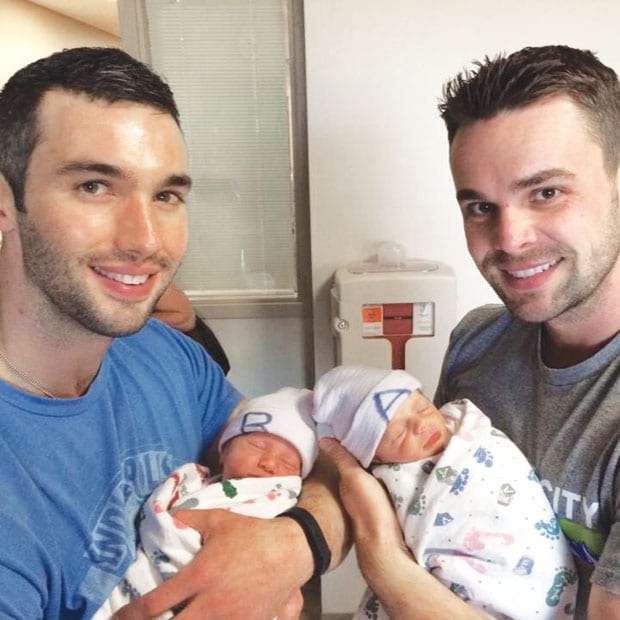Biological dads can’t get their own names on their sons’ birth certificate, judge rules

WHO’S YOUR DADDY? | Jason Hanna, left, holds one of his sons and his partner, Joe Riggs, hold the other soon after their births. A Tarrant County judge denied them legal rights to the boys, however, in their court proceedings. (Photo courtesy Hanna and Riggs)
Joe Riggs and Jason Hanna never expected to make national news after a surrogate mom gave birth to their twins.
Riggs, 33, and Hanna, 37, have been together almost four years. They’re best known in the community for collecting teddy bears at Christmas for Children’s Hospital to donate to children going through chemotherapy or other serious procedure. They’ve donated about 1,000 bears so far. At their Christmas parties, they also collect money to divide between the Family Equality Council and Stand Up to Cancer.
“I always wanted a family,” Hanna said. “We both grew up in loving households.”
Riggs said he just came out to his family in 2013.
“My dad was surprised,” Riggs said.
He described his father as an anti-marriage equality Republican who did an about face. They already knew Hanna but didn’t know about the relationship.
Last summer, the couple married in D.C. and in August had their religious ceremony at Cathedral of Hope. Riggs parents walked him down the aisle. His grandparents flew in for the ceremony as well.
But what would make the family complete for them was children. So last year, they enlisted the services of a surrogate to give birth to their biological children. Because Riggs had fertilized one of the eggs and Hanna the other egg that was implanted in the surrogate, they didn’t know which baby was biologically which dad’s when the boys were born. The eggs came from an anonymous out-of-state donor. So neither father’s name went on the birth certificate in the hospital.
So they went to court to end the surrogate’s parental rights and get their names on the birth certificates. The surrogate had signed the paperwork to relinquish her rights. (The woman who carried the babies had acted as surrogate before, but this was the first time she had done so for a gay couple.)
But the judge turned them down.
“The judge stated she couldn’t grant the adoptions with the petition in front of her,” Hanna said.
They had DNA tests and presented those tests as part of the petition. It didn’t matter. Not only did the judge turn down the surrogate’s request to end parental rights and have her name removed from the birth certificate, the judge refused to place the name of the biological dads on the birth certificates.
Finally, the judge turned down a request for each of the dads to adopt the other’s baby. So legally, the boys have one unrelated surrogate listed as their mother and no father.
“There are issues with these documents,” the judge said, without indicating what those issues were, according to Hanna.
“I was initially very shocked,” Riggs said.
He said their attorney argued that with biological dads willing to adopt their own sons and no one disputing the adoption, there was no reason to deny the petition. In Texas, gays are routinely allowed to adopt children.
Tarrant County attorney Lauren Duffer specializes in reproductive technology law and recommends refiling elsewhere to get the situation resolved as fast as possible.
“I don’t file any of my same-sex adoptions in Tarrant County,” she said.
She said Dallas is fine. Couples from around the state have filed in San Antonio for years. Travis is good. She’s even had some good results in Denton.
“Houston is making strides,” she said. “But absolutely never in Tarrant.”
She repeated one last bit of advise she’d give them if they were her clients. “Refile elsewhere,” she said. “Definitely do not refile in there.”
Duffer said venue is a choice in Texas and in this case, the paperwork should be filed as three separate motions. First file to end the surrogate’s parental rights and have her name removed from the birth certificates.
The next step, with paternity determined by DNA tests, is to have each biological dad’s name placed on the birth certificate of his own son. Duffer said those two things can be done at the same hearing as well as having each dad named as the other child’s joint managing conservator.
In Texas, a second parent adoption can’t be done for six months.
Since it’s an adoption, a home study needs to be done during that period and then should be filed in Dallas or San Antonio.
Riggs said they’re not sure what their options are yet. He said they could appeal or refile elsewhere.
Hanna said whatever they do, it will be whatever is in the best interest of their sons. He called it scary that if something happened, they have no proof they have custody of the children.
When the boys were born, he said it was magical when he placed his sons in his mother’s arms. Hanna said fatherhood is a whole new world.
“Our entire world is focused on our boys,” he said.
He said everyday it’s something new. He said their eye contact is new.
“Smiling. Laughing. Those moments are priceless,” he said.
“Being a father is a whole new love I’ve never experienced before,” Riggs said. “Two boys are entirely dependent on us.”
Hanna took two months paternity leave from work. When his leave is over, Riggs will take 10 weeks. During that time, they’ll decide about when to hire a nanny or find daycare. And during that time, they hope the paternity is resolved.
This article appeared in the Dallas Voice print edition June 20, 2014.

